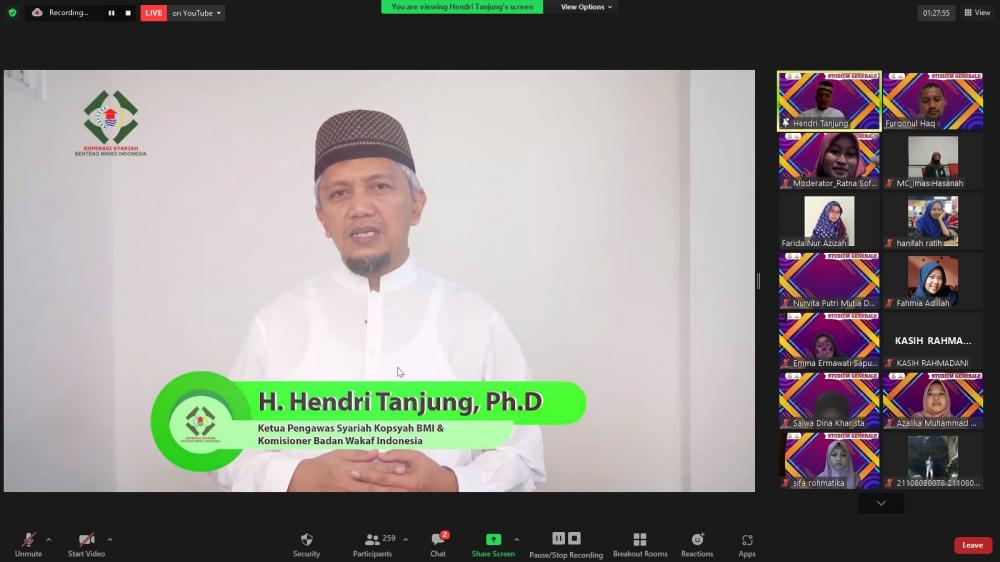Studium Generale 2021: Empowering Micro-Businesses through Islamic Philanthropy

On Wednesday, September 29, 2021, the Islamic Financial Management Program held a general lecture on the theme "Islamic Philanthropy for Empowering Micro Businesses" from 8:00 AM to 12:00 PM. The guest speaker for this lecture was Mr. Hendri Tanjung, Ph.D., a member of the Indonesian Waqf Board. The event was moderated by Ms. Ratna Sofiana, M.Sc., a lecturer from the Faculty of Islamic Economics and Business, and it was conducted via Zoom and live-streamed on YouTube, with 239 participants.
During the opening remarks, Dr. Misnen A, SE., M.Si., Sk., CA., ACPA, the Vice Dean I of the Faculty of Islamic Economics and Business, highlighted the commonplace nature of Islamic philanthropy in Indonesian society due to the majority being followers of Islam. He emphasized the significant potential of Islamic philanthropy in supporting economic growth. However, he also stressed the need for further socialization as the utilization of Islamic philanthropy is not well-organized and optimized, particularly in supporting the growth of micro-businesses. To promote Islamic philanthropy, collaboration between practitioners, social organizations, and academic communities is essential, guiding students to choose research themes related to Islamic philanthropy and fieldwork opportunities in various Islamic philanthropic institutions.
Representing the Head of the Islamic Financial Management Program, Ms. Sunarsih, expressed that these general lectures, conducted once per semester, aim to provide additional insights into the development of new knowledge related to Sharia financial management or Islamic economics. The hope is that students will develop themes for future research related to Islamic Social Finance, aligning with the theme of today's general lecture. Islamic Social Finance aims to balance the excess and shortage of funds among different groups in society.
In his presentation, Mr. Hendri Tanjung explained that zakat, etymologically, has four meanings: purification, growth, development, and grace. He emphasized that zakat is not philanthropy but an obligatory act and a pillar of Islam. Zakat existed before Prophet Muhammad, traceable to the times of Prophets Ibrahim, Ishaq, and Yaqub, as mentioned in various Quranic verses. The objectives of zakat according to Islamic law are education and soul purification, the establishment of justice, and realizing human welfare.
Mr. Hendri also discussed the economic benefits of zakat, such as being a distribution instrument of income, encouraging economic growth, promoting a strong work ethic among Muslims, providing financial resources for infrastructure development, and fostering ethical business practices. He further outlined four types of zakat: zakat on wealth, good business, companies, and professions.
The lecture also covered the differences between zakat, infaq, sedekah, and wakaf. Zakat is obligatory, while infaq, sedekah, and wakaf are recommended (sunnah). Zakat is fixed at 2.5%, while infaq, sedekah, and wakaf have flexible amounts. Zakat has a specific time of the year, while infaq, sedekah, and wakaf can be given at any time. Infaq is subject to a minimum threshold, unlike infaq, sedekah, and wakaf. Additionally, zakat does not require a specific declaration (ikrar), unlike infaq and sedekah, where it may or may not be declared. Wakaf, however, requires a declaration (ikrar).
Author: Aulia Nurul Safitri, Inayah Nadhira Pratiwi
